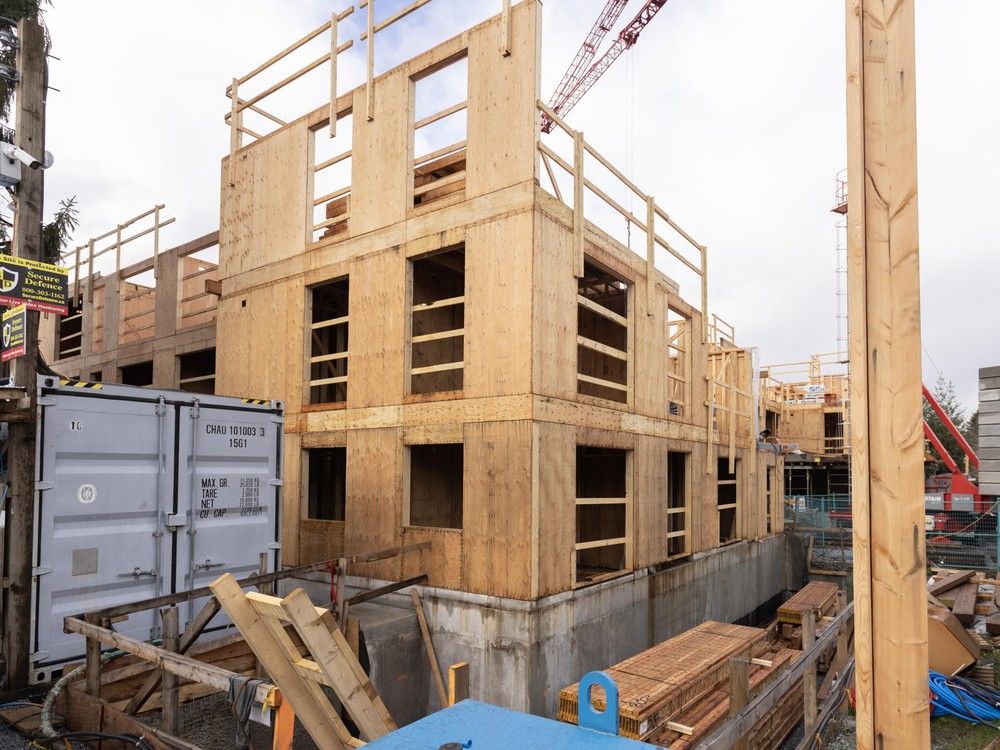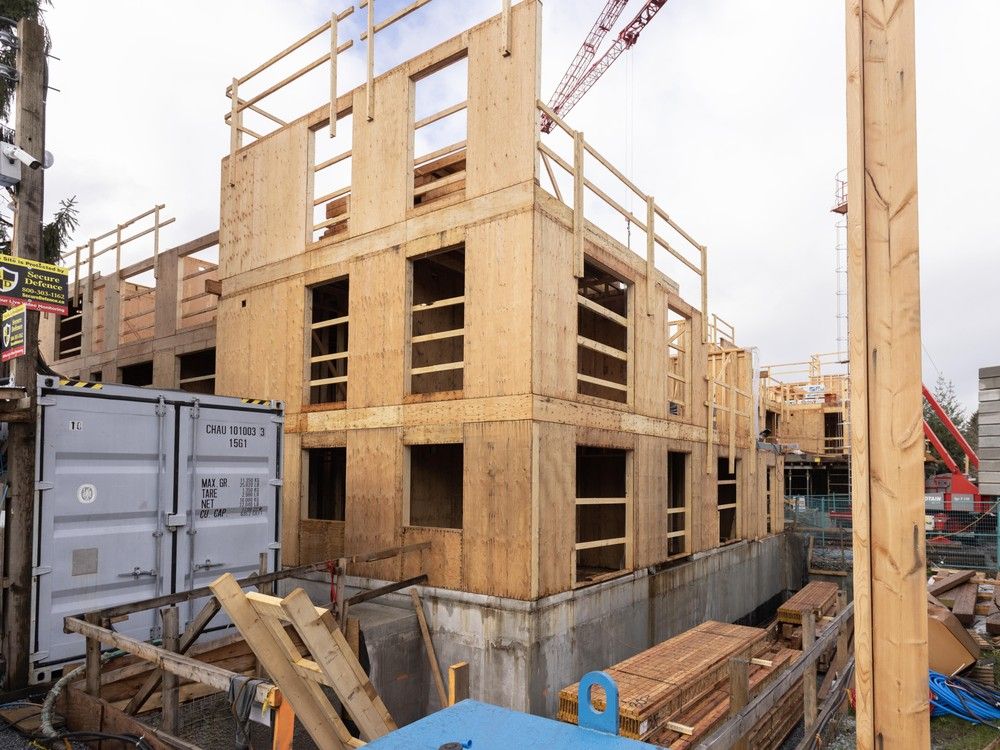The Bookless Club: What’s your take on Vancouver’s housing solutions?


There’s a new construction project on my block.
In the course of an afternoon, a bulldozer knocked down the small house that used to be on the small pie-shaped lot. Trucks have now carted away all the rubble. Nobody looks forward to construction on their block but, in this case, it does solve some problems. Or maybe it’s more like we’re just trading problems?
The house was modest. The yard was small. Someone raised a family of three kids in that house but they were all gone by the time I moved onto the street. Eventually, he died. She had a caregiver until she moved into assisted living. The house was sold.
Before the bulldozers came, the house was occupied by an ever-changing roster of skateboarders who the owners rented to in order to comply with the empty homes tax. Where once there was motivation to maintain the asset, now the objective simply became to avoid the penalty tax.
Not a whit of maintenance was done on the house for years. The garage filled up with garbage, old furniture and decommissioned appliances. Blackberries festooned the old potting shed. The fence fell down. The parties were audible two blocks away.
There are about a dozen homes like this in my neighbourhood. Completely and utterly derelict. Rat infested, and I don’t use the term “infested” lightly.
All of these properties are in total defiance of the City of Vancouver’s Standards of Maintenance Bylaw, but, with a wink and a nod, comply with the empty homes tax. Without the enforcement of the bylaw, the effect of the empty homes tax is to degrade existing housing stock and let neighbourhoods fill up with tenements.
But now the bulldozers have done their job. Where there was one small house there will now be six homes.
The neighbours are alarmed. They’ve made inquiries. They’re telling me that these new homes are postage stamp sized. They marvel at how they’ll be shoehorned onto that small footprint of land. One thing is certain: there’ll be absolutely no green space. And there’s a good chance there’ll be 12 cars parked out in front.
People need places to live. No one refutes that.
But what is lost when “home” becomes simply a closet, a microwave and a wall for the big screen TV? Where is the space for hobbies, Thanksgiving dinners, science fair projects, foul weather gear and bowling shoes?
Imagine Canada Day at one of these hyper-dense locations. Let’s say each unit has two occupants, and they invite just two guests over to celebrate. That tiny, pie shaped lot is now hosting 24 people. The musical tastes of the folks in Unit A include Peruvian speed metal; the folks in Unit B like Tommy Hunter — it’s Canada Day, after all! July 2 oughta be fun! Now, let’s say each unit has a pet.
Let’s say two of the units have people who do shift work. Let’s say one of the units likes to cook kippered herring on Sunday mornings. Let’s say just one of the units does their part to boost Canada’s flagging birthrate and that tiny resident is teething. Let’s say that, one day, that kid practises the violin each morning before school. Let’s say each unit has a different political affiliation and wants to put a sign at election time.
If you’re looking for a recession-proof job, consider strata law.
I’m not saying I have the answers. But I’m sure not liking the questions we’re all having to address these days.
This week’s question for readers:
What’s your take on Vancouver’s housing solutions?
Send your answers by email text, not an attachment, in 100 words or less, along with your full name to Jane at
. We will print some next week in this space.
Last week’s questions for readers:
Question: Do you actively grow your social circle? If so, how?
• I don’t work on expanding my social circle. I am an introvert. There is nothing wrong with me; I don’t need intervention or a 12-step program. I’m just misunderstood, mostly by extroverts. I am not misanthropic, aloof, or shy, and I don’t need counselling. I need and enjoy people, but they make me tired. I love them but, please, only in mercifully small doses. After a party, extroverts feel energized. They can find strength and are more creative by being around others. After a party, introverts may need a day or two of rest, and will do their best work alone. We usually enjoy one-on-one interactions, or quiet discussions among a small group of friends. Our lives are enriched by those we know and love. Holding onto our friends is as important as expanding our social circles, and there is nothing wrong with that. The lady in the article is a tragic figure, but those who enjoy being and doing their best work alone are, well, just different.
Perry Kilby
• So true of what happens to people who don’t expand their circle of friends and acquaintances. I am in my 80s and losing people out of my life almost daily. It’s so important to try to meet new people through gyms, libraries, senior facilities, etc. I still live a very active life, thanks to activities available, Also, volunteering is so rewarding.
Caroline Duncan
• As Barbra Streisand sang, “People who need people are the luckiest people in the world.” I live by this adage. As a senior, I moved to a new community where I didn’t know anybody. Through the gym, dog group and line-dancing I’ve connected with a new circle of friends. I still have my “old” friends and I love to socialize, but, at times, I enjoy the hermit life to recharge. So, it’s a balance. A friend I made when we were both in our sixties told me then that she thought it was too late to make new friends but the two of us meeting proved her wrong. We are social beings and sadly the electronic world we live in is taking this away from us … but not me!
Patricia Gray
• Despite losing some friends, my social life continues to evolve in my senior years. While some have died and others are inactive, I keep meeting new people and reconnecting with acquaintances when bumping into them at various outings or on the street in my neighbourhood when walking to shop, being introduced to new members in my Focal Point Art Salon which I established for established artists about 12 years ago, hiking in Pacific Spirit Park, ocean swimming and friends of friends with similar interest, philosophy and transparency. All of them except for one, are much younger.
Enda Bardell
• I have a lot of friends dating from the ’60s, however, I make a point of introducing myself to a newcomer to my exercise classes and have picked up a number of friends that way. I live in a single family neighbourhood, I take a plate of cookies and introduce myself when a new family moves in. I talk to people in line at the grocery store, the liquor store — wherever. I also recommend really listening to someone you know less well; like the rhododendron club member that started telling my husband and me how he was Bobby Orr’s first coach and had written a book with a forward by Bobby. I got to know my husband’s aunt a little better. She told me stories about being a widow working as a janitor for a school in Ontario. Sometimes she spent time leaning on her broom, discussing art with the English teacher as she was also interested in art. That teacher was Robert Bateman!
Linda Moore
• Your column in today’s paper coincides exactly with my friend and colleague’s visit from Edmonton. She said she is more and more averse to going out and dealing with people. In fact, she showed me a T-shirt her friend gave her that says “I hate people”. It was then that I quoted exactly what you did in your article: Kristin Scott Thomas’ character telling Fleabag, “people are all we’ve got.” I hope that gives her pause to remember the riches we receive daily from others — friends and strangers alike.
Great column!
Lois Kathnelson
• It has been my good fortune to be able to stay in touch, on a regular basis, with several friends I met in elementary school over 70 years ago. I also attend breakfast with a group of friends once a week and, other than during COVID, have done so since 1978. Our connection? We all worked in the medical field. Another group of more recent formation, is a Group of Seven of us (aged 55-79), known as the Domino Divas. We get together approximately every six weeks to play, catch up and feast. One of our members is moving out of province at the end of May and we will miss her dreadfully. However, we have each other as consolers and fully appreciate the value of that consolation.
Each of the above connections have been, and continue to be, lifelines of social connectedness for me, and each of these social circles have grown out of mutual interests, respect and love.
Cathy Holman
Jane, your friend has a form of Social Anxiety Disorder. There are many forms. Is it a branch of autism? Perhaps, there are many forms of autism. But that’s not the point. The point is — for people with this personality trait, socialization is NOT rejuvenating. It is work. It does not invigorate, it drains.
Conversation has to be practised. Body language has to be refined. There is judgment around every corner, in every face. And disaster awaits. The spilt glass. Saying the wrong thing. Not saying enough. Boring people. Blushing. Sweating. And the constant, incapacitating fear of doing all of the above.
Then, after the event comes the days of brutal self analysis. “Why did I say that? Why did I act that way? Why couldn’t I smile? Why couldn’t I fit in? I felt stupid. I felt alone.”
Your friend has probably gone through this dozens of times in her life. From grade six to age 60. She has simply decided that it’s not worth the pain. And that pain is real.
People who love to socialize and are energized by it do not realize — in fact cannot fathom — that EVERYONE does not feel exactly the same. They get angry at their friend who turns down yet another invitation. They may even write a newspaper column about it.
Trust me. That does not help.
LJ
Jane Macdougall is a freelance writer and former National Post columnist who lives in Vancouver. She will be writing on The Bookless Club every Saturday online and in The Vancouver Sun. For more of what Jane’s up to, check out her website here.
Related
Source: vancouversun.com

